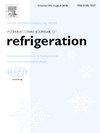Field study on the temperature uniformity of containerized batteries using a two-phase liquid cooling system under mismatched conditions
IF 3.5
2区 工程技术
Q1 ENGINEERING, MECHANICAL
International Journal of Refrigeration-revue Internationale Du Froid
Pub Date : 2024-10-30
DOI:10.1016/j.ijrefrig.2024.10.023
引用次数: 0
Abstract
The conventional liquid cooling system carries the risk of dew condensation and air cooling has poor thermal management performance for battery energy storage systems. To address these issues, a novel two-phase liquid cooling system was developed for containerized battery energy storage systems and tested in the field under mismatched conditions. The thermal management performance and safety during the charging and discharging processes were analyzed by investigating the main influencing factors, including battery temperature and cooling system characteristics (battery temperature variation, temperature uniformity, supply liquid temperature, cold plate temperature distribution, and compressor status). The results showed that the novel system can maintain a maximum cell temperature difference of less than 3 °C at the rack level and less than 2 °C at the pack level, resulting in a 60% reduction compared to the traditional air cooling system. Relative to a supply liquid temperature of 15∼25 °C, a relatively high supply temperature of 20∼30 °C for two-phase liquid cooling can not only reduce the running time of the compressor but also enhance its start-stop consistency. Compared to other studies, this novel system is reliable and safe for containerized energy storage batteries, even in capacity mismatch and direct return pipeline conditions.
在不匹配条件下使用两相液体冷却系统对集装箱式电池的温度均匀性进行实地研究
传统的液体冷却系统存在结露风险,而空气冷却对电池储能系统的热管理性能较差。为解决这些问题,针对集装箱式电池储能系统开发了一种新型两相液体冷却系统,并在不匹配的条件下进行了现场测试。通过研究主要影响因素,包括电池温度和冷却系统特性(电池温度变化、温度均匀性、供液温度、冷板温度分布和压缩机状态),分析了充放电过程中的热管理性能和安全性。结果表明,新型系统能将电池架层面的最大电池温差保持在 3 °C 以下,电池组层面的最大电池温差保持在 2 °C 以下,与传统的空气冷却系统相比降低了 60%。相对于 15 ∼ 25 °C 的供液温度,20∼ 30 °C 的相对较高的两相液体冷却供液温度不仅能缩短压缩机的运行时间,还能提高其启停一致性。与其他研究相比,即使在容量不匹配和直接回流管道条件下,这种新型系统对于集装箱式储能电池也是可靠和安全的。
本文章由计算机程序翻译,如有差异,请以英文原文为准。
求助全文
约1分钟内获得全文
求助全文
来源期刊
CiteScore
7.30
自引率
12.80%
发文量
363
审稿时长
3.7 months
期刊介绍:
The International Journal of Refrigeration is published for the International Institute of Refrigeration (IIR) by Elsevier. It is essential reading for all those wishing to keep abreast of research and industrial news in refrigeration, air conditioning and associated fields. This is particularly important in these times of rapid introduction of alternative refrigerants and the emergence of new technology. The journal has published special issues on alternative refrigerants and novel topics in the field of boiling, condensation, heat pumps, food refrigeration, carbon dioxide, ammonia, hydrocarbons, magnetic refrigeration at room temperature, sorptive cooling, phase change materials and slurries, ejector technology, compressors, and solar cooling.
As well as original research papers the International Journal of Refrigeration also includes review articles, papers presented at IIR conferences, short reports and letters describing preliminary results and experimental details, and letters to the Editor on recent areas of discussion and controversy. Other features include forthcoming events, conference reports and book reviews.
Papers are published in either English or French with the IIR news section in both languages.

 求助内容:
求助内容: 应助结果提醒方式:
应助结果提醒方式:


